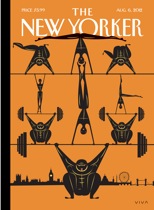 August 6, 2012: “Thank You for the Light” by F. Scott Fitzgerald.
August 6, 2012: “Thank You for the Light” by F. Scott Fitzgerald.
Since F. Scott Fitzgerald isn’t around to defend himself or answer questions, this week’s fiction, a “rediscovered” Fitzgerald story, is discussed in a podcast by fiction editor Deborah Treisman. The introduction to the podcast includes the rejection letter The New Yorker sent Fitzgerald’s agent when the story was submitted in 1936. They didn’t like it much then, and they probably should have stuck to their guns. (I suppose they get kudos for publishing a “new” Fitzgerald story, even a bad one.)
But anyway, here it is. Interestingly, the story features a woman, a widow who travels a sales territory peddling women’s undergarments. She works hard and doesn’t read and can’t watch movies to relax, so she’s quite hooked on smoking. In her new territory, it’s more difficult than it had been, which causes her more stress, which makes her want to smoke more. She slips inside a Catholic church where she figures she might light her cigarette on a votive candle. But then . . .
I won’t even attempt to say what the story is supposed to mean. That even the smallest prayers will be answered if asked in the right way? That the Virgin Mary loves hard working women?
What did you think?

“What did you think?”
That we should be thrilled that the New Yorker didn’t give us another novel excerpt!
Actually, I find it interesting because of its shortcomings. Babe Ruth didn’t get a hit every time at bat. Michael Jordan didn’t score every time he took a shot. Some of warren Buffett’s investments have tanked. It’s perfectly reasonable to assume even great writers, and even those who are greater than Junot Diaz :-), will produce duds every now and then. Seeing something like this, and being reminded (other than through a bio) that even someone like Fitzgerald is, when all is said and done, just a human, makes me appreciate his masterpieces that much more.
But the podcast spoiled it a bit, as Treisman tried to spin it as being better than it was. Oh well . . . .
Discovering new material from the greats is like unearthing another pharaonic burial. Regardless of whether it delivers a Tutankhamon-like treasure trove or just falls short of our unrealistic expectations, it is always a welcome window into another place and time. Most importantly, it should be a cherished opportunity to sneak a furtive glance into the brilliant minds of the geniuses that have wrought western civilization. Last, but definitely not least, it’s yet another reminder that these demigods of literature were very human in every sense of the word; not every drop of ink flowing from their pens was the blood of masterpieces. And for that, as an aspiring writer, I thank them most.